Related Research Articles

The Jewish Defense League (JDL) is a Jewish far-right religious-political organization in the United States and Canada, whose stated goal is to "protect Jews from antisemitism by whatever means necessary". It has been classified as "a right wing terrorist group" by the FBI since 2001, and is designated a hate group by the Southern Poverty Law Center. According to the FBI, the JDL has been involved in plotting and executing acts of terrorism within the United States. Most terrorism watch groups classify the group as inactive.
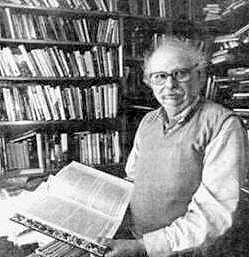
Israel Shahak was an Israeli professor of organic chemistry at the Hebrew University of Jerusalem, a Holocaust survivor, an intellectual of liberal political bent, and a civil-rights advocate and activist on behalf of both Jews and Gentiles (non-Jews). For twenty years, he headed the Israeli League for Human and Civil Rights (1970–90) and was a public critic of the policies of the governments of Israel. As a public intellectual, Shahak's works about Judaism proved controversial, especially the book Jewish History, Jewish Religion: The Weight of Three Thousand Years (1994).
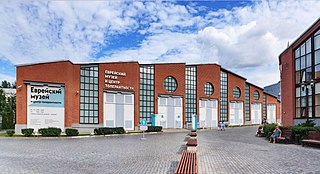
The history of the Jews in Russia and areas historically connected with it goes back at least 1,500 years. Jews in Russia have historically constituted a large religious and ethnic diaspora; the Russian Empire at one time hosted the largest population of Jews in the world. Within these territories, the primarily Ashkenazi Jewish communities of many different areas flourished and developed many of modern Judaism's most distinctive theological and cultural traditions, while also facing periods of antisemitic discriminatory policies and persecution, including violent pogroms. Some have described a "renaissance" in the Jewish community inside Russia since the beginning of the 21st century; however, the Russian Jewish population has experienced precipitous decline since the dissolution of the USSR which continues to this day, although it is still among the largest in Europe.
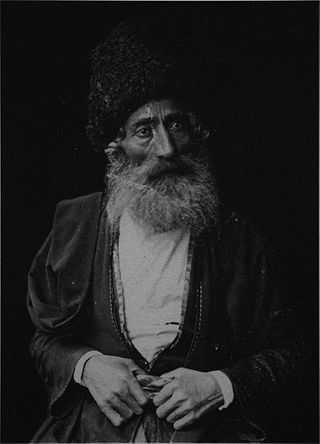
Georgian Jews are a community of Jews who migrated to Georgia during the Babylonian captivity in the 6th century BCE. It is one of the oldest communities in that land.
The Anti-Zionist Committee of the Soviet Public was a body formed in 1983 in the Soviet Union as an anti-Zionist propaganda tool. Formation of AZCSP was approved on 29 March 1983 by the Secretariat of the Central Committee of the Communist Party of the Soviet Union in resolution 101/62ГС: "Support the proposition of the Department of Propaganda of the Central Committee and the KGB USSR about the creation of the Anti-Zionist Committee of the Soviet Public..."

Yelena Georgiyevna Bonner was a human rights activist in the former Soviet Union and wife of the physicist Andrei Sakharov. During her decades as a dissident, Bonner was noted for her characteristic blunt honesty and courage.
Interregional Academy of Personnel Management is a private higher education institution in Ukraine. Founded in 1989 as a non-state establishment, the MAUP consists of a preparatory department, a lyceum, college, institutes and postgraduate school and has over 50,000 students in many branches throughout the country. Since 1991, MAUP has been publishing the Personnel magazine and the Personnel Plus newspaper. In 2008, the U.S. State Department published its "Contemporary Global Anti-Semitism: A Report Provided to the United States Congress" and singled out MAUP when it stated the organization "is one of the most persistent anti-Semitic institutions in Eastern Europe."

Shlomo Dov Pinchas Lazar, better known as Berel Lazar, is an Orthodox, Chabad-Lubavitch Hasidic rabbi. He began his service in Russia in 1990. Known for his friendship with Vladimir Putin, since 2000, he has been a Chief Rabbi of Russia, and chairman of the Federation of Jewish Communities of Russia and Federation of Jewish Communities of the CIS. In September 2005 Lazar became a member of the Public Chamber of Russia. Because of his connections to Russian President Vladimir Putin he is sometimes called "Putin's rabbi."

Agudath Israel Etz Ahayem is a Conservative Jewish congregation located at 3525 Cloverdale Road in Montgomery, Alabama.
Alexander Koptsev is a Russian-born terrorist. On January 11, 2006, Kopstev burst into Bolshaya Bronnaya Synagogue in Moscow, Russia during evening prayers and stabbed eight people with a hunting knife before being wrestled to the ground by the congregation's leader, Rabbi Yitzhak Kogan, and his son Yosef Kogan. Four of those injured were in serious condition. On January 13, 2006, Koptsev was charged with racially motivated attempted murder and humiliation of a religious group. He has been described by Russian media as a racist skinhead.
The Berne Trial was a famous court case in Berne, Switzerland which took place between 1933 and 1935. Two organisations, the Swiss Federation of Jewish Communities and the Bernese Jewish Community sued the far-right Swiss National Front for distributing anti-Jewish propaganda. The trial focussed on the Front's use of the fraudulent antisemitic text, The Protocols of the Elders of Zion. Ultimately decided in favour of the plaintiffs, the Front was ordered to pay a symbolic fine and court costs. However, the trial became significant both for the international coverage and also for the extensive evidence presented, demonstrating the falsehoods contained in The Protocols.

The history of the Jews in Argentina goes back to the early sixteenth century, following the Jewish expulsion from Spain. Sephardi Jews fleeing persecution immigrated with explorers and colonists to settle in what is now Argentina, in spite of being forbidden from travelling to the American colonies. In addition, many of the Portuguese traders in the Viceroyalty of the Río de la Plata were Jewish. An organized Jewish community, however, did not develop until after Argentina gained independence from Spain in 1816. By mid-century, Jews from France and other parts of Western Europe, fleeing the social and economic disruptions of revolutions, began to settle in Argentina.
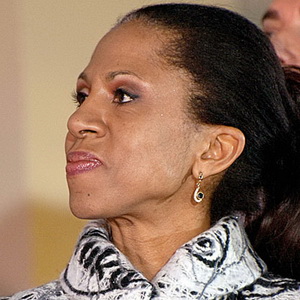
Yelena Abdulaevna Khanga, also transliterated as Elena Hanga, is a Russian journalist who was raised in Moscow, USSR, and came to the United States in 1990 to write Soul to Soul: The Story of a Black Russian American Family: 1865–1992. Khanga divides her time between New York City and Moscow.
Adolf Solomonovich Shayevich is a Soviet and Russian Orthodox rabbi who has been the rabbi of the Moscow Choral Synagogue since 1983, which is traditionally regarded as Moscow's main Jewish house of prayer.
Antisemitism —prejudice, hatred of, or discrimination against Jews— has experienced a long history of expression since the days of ancient civilizations, with most of it having originated in the Christian and pre-Christian civilizations of Europe.
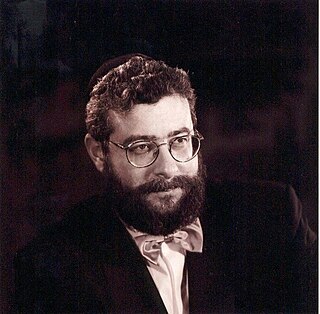
Pinchas Goldschmidt is a Swiss-born, internationally known rabbi, scholar, and Jewish community leader. He was the Chief Rabbi of Moscow, Russia from 1993 until 2022, serving at the Moscow Choral Synagogue. He also founded and has headed the Moscow Rabbinical Court of the Commonwealth of Independent States (CIS) since 1989. From 2011, Goldschmidt has served as president of the Conference of European Rabbis (CER), which unites over seven hundred communal rabbis from Dublin, Ireland to Khabarovsk, in the Russian Far East.

The history of the Jews in Moscow goes back from the 17th century, the city of Moscow held 175,000 Jews from the Nazis although Moscow did not become an important Jewish center until the late 19th century when more Jews were legally allowed to settle. Prior to the 19th century, Jews had arrived in the city as prisoners of the Russo-Polish war or after 1790, as merchants allowed one month stays. In the late 1800s, the Jewish population boomed, and then dramatically dropped after the 1891 expulsion of Jews from the city. The population grew once again following World War I, and was a Jewish and Zionist cultural center until the end of the revolution, after which it became a Soviet Jewish center for a period of time. The Moscow Jewish community experienced a number of highs and lows under the Soviet Union as Jewish identity became increasingly taboo in the eyes of the government. After the collapse of the Soviet government and the mass migration of a huge portion of Russian Jews from the country, Moscow has still maintained a sizable Jewish population.
This timeline of antisemitism chronicles the facts of antisemitism, hostile actions or discrimination against Jews as a religious or ethnic group, in the 21st century. It includes events in the history of antisemitic thought, actions taken to combat or relieve the effects of antisemitism, and events that affected the prevalence of antisemitism in later years. The history of antisemitism can be traced from ancient times to the present day.
Abraham Feinberg was an American rabbi who lived much of his life in Canada. In his obituary, The New York Times declared about him: "He was always ready to march, lend his name or send a telegram if there was a protest for disarmament or for a treaty on a nuclear test ban, or against racism in South Africa, radical injustice in America and United States policy in Vietnam."

The Lomza Yeshiva was an Orthodox Jewish yeshiva in Łomża, Poland, founded by Rabbi Eliezer Bentzion Shulevitz in 1883. Rabbi Yechiel Mordechai Gordon served as the yeshiva's rosh yeshiva for many years, and Rabbi Moshe Rosenstain served as the mashgiach. A branch of the yeshiva was established in Petach Tikvah, Palestine in 1926, where Rabbi Reuven Katz served as co-rosh yeshiva alongside Rabbi Gordon.
References
- ↑ Tavernise S. "Bomb Attack Shows That Russia Hasn't Rooted Out Anti-Semitism" Archived 2003-05-10 at the Wayback Machine , 1 June 2002.
- ↑ Coalson R. "Getting Radical About Extremism", Moscow Times (19 July 2002.)
- ↑ Gorodetsky L. "Russian law enforcement urged to curb anti-Semitic extremists", Jewish Telegraphic Agency
- "NCSJ Rejects Police Explanation", NCSJ (6 June 2002)